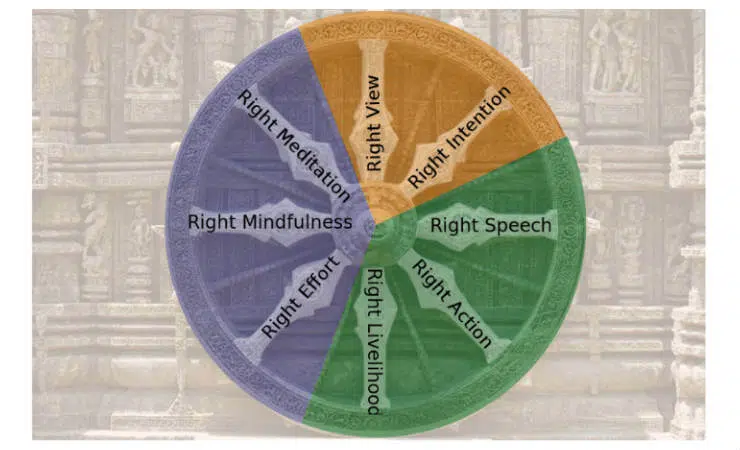
Magga (Middle Way), known as the Eightfold Noble Path, often represented as the wheel of clarity, is the prescription to end suffering. The eight spokes are the steps of the Buddha’s path which encapsulate entirety of the dharma, or teachings. The Buddha taught that anyone who follows this path will reach enlightenment; you can practice any or no religion, including Buddhism, but these 8 criteria must be followed. He taught an ideal way of living but also provided a detailed method by which we can practice to understand the truth of life.
The Middle Way
The core of the Buddha’s teaching is avoiding the of poles of extreme asceticism (excessive austerity with ourselves or others) and spiritual laziness (indulgence). We must approach all our experiences with basic friendliness and respect. In the context of meditation practice, this means gently placing awareness in a framework of “not too tight, not too loose”. But the Buddha wisely suggested study and contemplation to inform the practice. We need to understand what we are doing, why we are doing it, and how mindfulness relates to the rest of our lives.
The eight steps train us in 3 areas:
- Morality: to guard our speech and behavior;
- Concentration: to focus our mind, to keep it pure and aware of reality;
- Wisdom: to understand reality based on our focused awareness.
The Right View/Skillful Understanding
Our views determine how we live. For example, for those who believe in an eternal soul, will view suffering in this world differently. Buddhist psychology endeavors to give up all views based on beliefs or logical reasoning, in favor of a direct and experiential understanding of reality. The accounts of NDE (near death experience) are a good example. If we see bright light, it is that, just bright light. We should not develop views based on our beliefs.
Three aspects of right view
1. Quality of the mind
There is a distinction between doing things skillfully and unskillfully. Without this foundation, we can’t even begin the path. In Buddhist psychology, the morality of our actions depends upon the quality of the mind. So if the quality of the mind is loving-kindness, compassion or equanimity, this leads to an ethical act. An act coming from greed, hatred or delusion will not result in an ethical action. So the quality of the mind which is fostered by the view, affects our actions.
2. Understanding the four noble truths
The first truth is that life is unsatisfactory, i.e. it does not provide permanent satisfaction. The second: dissatisfaction stems from grasping, when we identify ourselves with things or want things to be other than as they are. The third: There is a way out of this predicament. The fourth: The eight-fold path is the method for escaping dissatisfaction.
3. Not clinging to or identifying with anything
This is a mental or emotional state in which we understand right view as not clinging or identifying. The four noble truths can be internalized. Then we cease to identify ourselves with our attachments: material things, views, including our own, and even one’s own mind. As the Buddha taught, the dharma is like a raft which we use to cross the river; once we reach the other shore we discard it. So we accept the teachings as a set of views to take us somewhere else and then we cease to cling to them. The teachings are still accurate, but we no longer identify them as “mine.” When people praised the Buddha for his views, he was not elated; when he was criticized, he wasn’t upset, because he didn’t identify himself with his views. When we are not invested in our views, we are in a place of wisdom, kindness and less stress – whether other people agree with us or not.
When we practice meditation, we begin to see the suffering and unsatisfactoriness of life. The Buddha taught that there is no dhamma or reality worth clinging to, something that we think is going to make us happy only leads to suffering. A simple understanding of what’s arising here and now and not expecting more of it.
Skillful understanding leads us to act in accord with the four noble truths, with a comprehension of cause of suffering and a means to escape it. We must take responsibility for the results of our intentional actions, leading to change in our behavior. Facing dissatisfaction helps us recognize true happiness. The eight steps of the Buddha’s path to happiness show us the way to end dissatisfaction and achieve total happiness.
